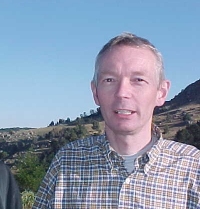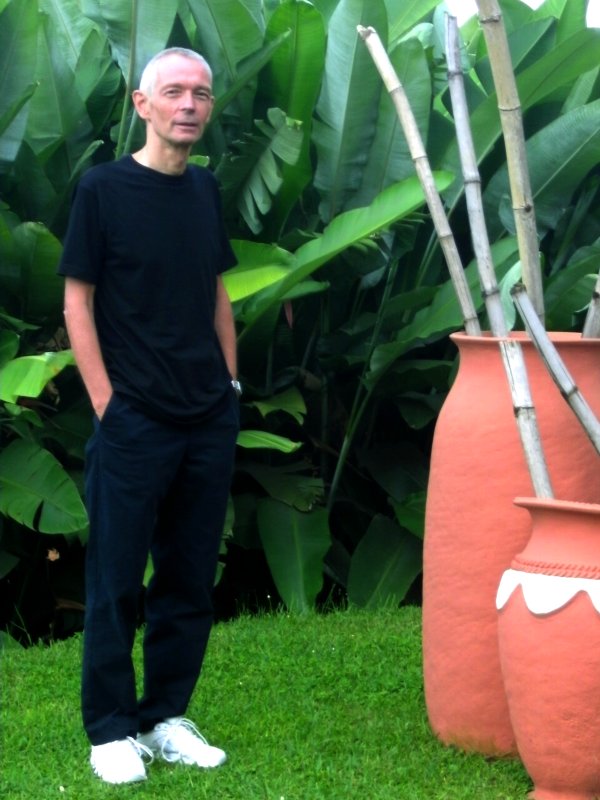[ The flags, by the way, are here for purely decorative purposes, representing the countries where I have spent more than two years of my life ... In fact I dislike flags, for the way they are used, (and can be abused.) ]
 I was born in Hannover in (West-)Germany, and grew up in Hamburg and in Munich, (although I have always found myself out of sympathy with Bavarians and their way of thinking.) When I was 17 years old, after my father had died, I was able to move to the UK, to finish secondary school at Atlantic College in South Wales. And for most of my life since then I have not spent much time in Germany, although I had – and still have – some close German friends; once, but after my mother had died, there even was a gap of more than two years between two visits. My sister, too, has spent most of her life outside Germany, mostly in France.
I was born in Hannover in (West-)Germany, and grew up in Hamburg and in Munich, (although I have always found myself out of sympathy with Bavarians and their way of thinking.) When I was 17 years old, after my father had died, I was able to move to the UK, to finish secondary school at Atlantic College in South Wales. And for most of my life since then I have not spent much time in Germany, although I had – and still have – some close German friends; once, but after my mother had died, there even was a gap of more than two years between two visits. My sister, too, has spent most of her life outside Germany, mostly in France.
 After the two years at AC, I spent 11 very academic, very enjoyable years at universities in the UK, first studying Mathematics for five years, where my special area was Relativity, and then Philosophy for six, especially Philosophy of Mind (psychoanalysis) and of Language (Chomskian linguistics,) although I was able to develop and pursue a wide range of other interests.
After the two years at AC, I spent 11 very academic, very enjoyable years at universities in the UK, first studying Mathematics for five years, where my special area was Relativity, and then Philosophy for six, especially Philosophy of Mind (psychoanalysis) and of Language (Chomskian linguistics,) although I was able to develop and pursue a wide range of other interests.
 During those years I went to the United States for a few months every summer to work at a 4H-camp on Long Island, not far from New York, which provided a good contrast to my academic life the rest of the year. I have continued to go to the US regularly, mostly to NY and the East Coast, where many of my friends have ended up.
During those years I went to the United States for a few months every summer to work at a 4H-camp on Long Island, not far from New York, which provided a good contrast to my academic life the rest of the year. I have continued to go to the US regularly, mostly to NY and the East Coast, where many of my friends have ended up.
Although I had never planned to become a teacher, when a friend mentioned that he had seen an advertisement for a position as 'assistant master' at Atlantic College, I decided to go for it – and I have never regretted it. So there I was in South Wales again, teaching Mathematics and beginners' Japanese; and for a number of years also Theory of Knowledge.
 Having spent half my life, quite precisely, at Atlantic College, as a student and as a teacher, I decided to 'retire' to Berlin – one of only two cities in Germany I was considering: and it has not felt like 'returning' somewhere at all! – and at the same time to Kigali, (in Rwanda, not in the Rhonda ...) where I have been very happy and have made – and continue to make – close friends.
Having spent half my life, quite precisely, at Atlantic College, as a student and as a teacher, I decided to 'retire' to Berlin – one of only two cities in Germany I was considering: and it has not felt like 'returning' somewhere at all! – and at the same time to Kigali, (in Rwanda, not in the Rhonda ...) where I have been very happy and have made – and continue to make – close friends.
After five years of teaching at a school there, (Mathematics, Theory of Knowledge and sometimes German) I found I wanted to spend more time in Berlin and travelling, and so I retired again; but for two more years I was still involved in various construction projects at the school, and the next year I was called twice to cover classes – five weeks of German in grades 5 to 8, and two months of Psychology and English Language and Literature in grades 10 to 12.
But since mid-2017 I am retired again, spending about 6 months every year in Rwanda, 4 months in Europe, mostly in Berlin and mostly in the summer, and almost 2 months in the US – it suits me very well to have 'three lives' like this. (My friends know where they can read about the Rwanda-part of my life.)
Well, still not completely retired: when a German friend of mine, who is a Maths professor in Edinburgh, came to Kigali in 2017 to teach an intensive three-week course at AIMS (African Institute for Mathematical Sciences), where students from different countries in Africa come to take a Master's degree in Maths, he told me that they were in need of an English teacher, and asked me if I would be willing to do this. For one year I shared the teaching with a Kenyan former colleague, but since he moved to an IB school in Egypt, I have been teaching all the classes, including some to students in the AMMI (African Masters in Machine Intelligence) programme, a total of up to 14 hours a week – almost like a job, no? It is nice that I can use my Maths and my programming, (LaTeX and Python) and that I don't have to set or mark exams or homework – a bit of a commute, but all very enjoyable.
- (a + b)2 is not the same as a2 + b2, (except in special cases.) Thinking that they are identical is an instance of what I have heard being called 'Mickey Mouse mistakes'.
- If I know of a family that they have two children, and that at least one of them is a boy, (assuming the birth of a boy and a girl to be equally likely,) the probability of both the children being boys is not 1/2.
- It is not a valid proof of a proposition, such as a trigonometric identity, to start with that proposition and derive from it something that is obviously true, such as an identity of the form
a = a. - Even though it is correct that
∫ 1/x dx = ln x + c ,
it is not therefore also correct that
∫ 1/x2 dx = ln x2 + c .
This critical thinking can then apply (if one is that kind of person ...) to a wide range of issues, some quite mundane, such as rumours: their very nature not only means that they are usually false or exaggerated, but also that they will spread more easily than any evidence against them.
(Note that moral issues are never far away ...)
 This is how to write Hello. (Konnichi wa.) in what was at some time called "the devil's language."
This is how to write Hello. (Konnichi wa.) in what was at some time called "the devil's language."
As are my web-design and programming skills (again: whatever little I know ...) – self-taught, that is.

